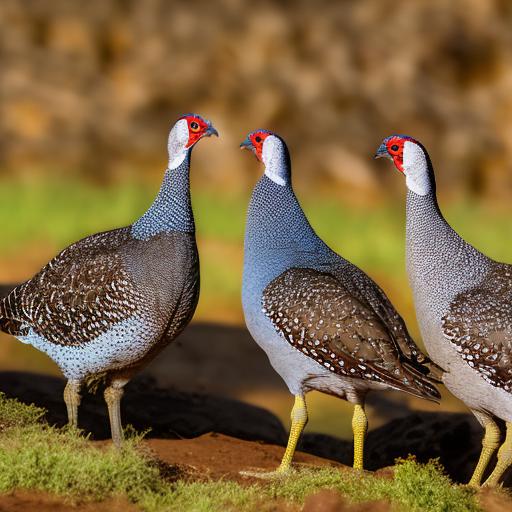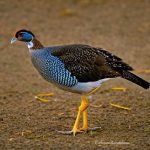Guinea fowl keeping in Kenya has gained popularity in recent years due to the numerous benefits associated with these birds. Guinea fowl are known for their ability to control pests such as ticks, flies, and other insects, making them valuable assets on farms and homesteads. In addition to their pest control abilities, guinea fowl also provide a source of meat and eggs, making them a valuable addition to small-scale farming operations. The meat of guinea fowl is lean and flavorful, and their eggs are prized for their rich, flavorful yolks.
Guinea fowl are also relatively low maintenance birds, making them an attractive option for farmers and homesteaders looking to diversify their livestock. They are hardy birds that can adapt to a variety of climates and are known for their ability to forage for much of their own food. In Kenya, guinea fowl are commonly kept in free-range systems, where they are allowed to roam and forage for insects and plants. This not only reduces the cost of feeding the birds but also allows them to exhibit natural behaviors, resulting in healthier and happier birds. Overall, guinea fowl keeping in Kenya offers a range of benefits, from pest control to meat and egg production, making it a valuable enterprise for small-scale farmers and homesteaders.
Key Takeaways
- Guinea fowl keeping is a popular practice in Kenya due to their low maintenance and high-quality meat and eggs.
- When choosing the right breed of guinea fowl, consider factors such as climate, purpose (meat or eggs), and availability in Kenya.
- Guinea fowl require adequate housing and space to roam, with protection from predators and adverse weather conditions.
- Feeding guinea fowl a balanced diet with access to fresh water is essential for their health and productivity.
- Regular health checks, vaccination, and disease management are crucial for maintaining a healthy guinea fowl flock in Kenya.
- Understanding the breeding and reproduction process of guinea fowl is important for successful reproduction and maintaining a sustainable flock.
- Marketing and selling guinea fowl products in Kenya can be profitable, with opportunities for selling meat, eggs, and feathers to local markets and restaurants.
Choosing the Right Breed of Guinea Fowl
When it comes to choosing the right breed of guinea fowl for your farm or homestead in Kenya, there are several factors to consider. The most common breeds of guinea fowl found in Kenya include the Helmeted Guinea Fowl, the Vulturine Guinea Fowl, and the Crested Guinea Fowl. Each breed has its own unique characteristics and traits, so it’s important to choose a breed that aligns with your specific needs and goals.
The Helmeted Guinea Fowl is the most common breed found in Kenya and is known for its hardiness and adaptability to different climates. They are also prolific layers and good foragers, making them a popular choice for small-scale farmers. The Vulturine Guinea Fowl, on the other hand, is known for its striking appearance, with its blue face and neck and long white plumes. They are also good foragers and can thrive in free-range systems. The Crested Guinea Fowl is known for its distinctive crest of feathers on its head and is valued for its ornamental qualities. When choosing a breed of guinea fowl, it’s important to consider factors such as climate, available space, and intended use (meat production, egg production, or ornamental purposes) to ensure that you select the right breed for your specific needs.
Housing and Space Requirements for Guinea Fowl
Proper housing and space requirements are essential for the health and well-being of guinea fowl. When it comes to housing guinea fowl in Kenya, it’s important to provide them with a secure and predator-proof coop or shelter to protect them from predators such as foxes, dogs, and birds of prey. The coop should be well-ventilated and provide adequate space for the birds to roost and nest. Additionally, providing nesting boxes filled with straw or shavings will encourage hens to lay eggs in a designated area, making egg collection easier.
In terms of space requirements, guinea fowl are active birds that require ample space to roam and forage. For free-range systems, it’s recommended to provide at least 10 square feet of space per bird to allow them to exhibit natural behaviors such as dust bathing and foraging for insects and plants. Fencing is also important to keep guinea fowl contained within a designated area and protect them from predators. Overall, providing proper housing and adequate space for guinea fowl is essential for their health and well-being, as well as for maximizing their productivity.
Feeding and Nutrition for Guinea Fowl
Feeding and nutrition play a crucial role in the health and productivity of guinea fowl. Guinea fowl are omnivorous birds that require a balanced diet consisting of grains, seeds, insects, and plants. In free-range systems, guinea fowl will forage for much of their own food, consuming insects such as grasshoppers, crickets, and ticks, as well as seeds and plants. However, supplemental feeding is often necessary, especially during periods of low insect availability or when raising guinea fowl for meat or egg production.
A balanced commercial poultry feed can be provided to supplement the diet of guinea fowl, ensuring that they receive essential nutrients such as protein, vitamins, and minerals. It’s important to choose a feed specifically formulated for guinea fowl or game birds to meet their unique nutritional requirements. Additionally, providing access to grit or coarse sand is important for guinea fowl to aid in digestion, as they do not have teeth and rely on grit to grind their food in their gizzards. Overall, ensuring that guinea fowl receive a balanced diet that meets their nutritional needs is essential for their health and productivity.
Health and Disease Management for Guinea Fowl
Maintaining the health of guinea fowl is essential for ensuring their productivity and well-being. Like all poultry, guinea fowl are susceptible to a range of diseases and health issues that can impact their overall health and productivity. Common health issues in guinea fowl include respiratory infections, parasites such as mites and lice, and nutritional deficiencies. It’s important to monitor the health of guinea fowl regularly and seek veterinary care if any signs of illness or distress are observed.
Preventative measures such as vaccination programs, parasite control, and providing a clean and sanitary living environment can help reduce the risk of disease in guinea fowl. Additionally, providing a balanced diet that meets their nutritional needs is essential for maintaining their overall health and immune function. Regular cleaning of the coop or shelter, as well as providing access to clean water at all times, can also help prevent the spread of disease among guinea fowl. Overall, proactive health management practices are essential for ensuring the health and well-being of guinea fowl.
Breeding and Reproduction of Guinea Fowl

Breeding and reproduction are important aspects of guinea fowl keeping in Kenya, especially for those interested in expanding their flock or producing guinea fowl for meat or egg production. Guinea fowl are seasonal breeders, with peak breeding activity occurring during the rainy season when food availability is high. During this time, male guinea fowl will display courtship behavior such as strutting and calling to attract females.
To encourage successful breeding, it’s important to provide a suitable nesting area with plenty of straw or shavings for hens to lay eggs. Collecting eggs regularly can help prevent them from being damaged or eaten by predators. Incubating eggs using an artificial incubator or allowing broody hens to hatch eggs naturally are common methods used to hatch guinea fowl eggs. It’s important to provide a warm and secure environment for hatching eggs to ensure successful hatching and healthy chicks.
Once hatched, guinea fowl chicks require warmth, protection from predators, and access to a balanced chick starter feed to support their growth and development. Providing proper care and nutrition during the early stages of life is essential for ensuring the health and vitality of guinea fowl chicks. Overall, understanding the breeding behavior of guinea fowl and providing proper care during the breeding and hatching process is essential for successful reproduction.
Marketing and Selling Guinea Fowl Products in Kenya
Marketing and selling guinea fowl products in Kenya can be a lucrative venture for small-scale farmers and homesteaders. Guinea fowl meat is prized for its lean texture and rich flavor, making it a popular choice among consumers looking for high-quality poultry products. Additionally, guinea fowl eggs are valued for their rich, flavorful yolks and can be sold at premium prices compared to chicken eggs.
When marketing guinea fowl products, it’s important to highlight the unique qualities of guinea fowl meat and eggs, such as their flavor, nutritional value, and natural production methods. Direct marketing through farmers’ markets, local stores, or online platforms can help reach consumers interested in purchasing high-quality guinea fowl products. Additionally, partnering with restaurants or specialty food stores that value locally sourced and sustainable products can help create a market for guinea fowl products.
In addition to meat and eggs, other guinea fowl products such as feathers or ornamental birds can also be marketed to individuals interested in crafts or ornamental poultry keeping. By highlighting the unique qualities of guinea fowl products and targeting niche markets interested in high-quality poultry products, small-scale farmers can successfully market and sell guinea fowl products in Kenya.
Furthermore, the distinct spotted feathers of guinea fowl can be used in a variety of crafts, such as jewelry, clothing, and home decor. Additionally, the ornamental nature of guinea fowl makes them popular among hobbyists and collectors of rare and unique poultry breeds. By tapping into these niche markets and emphasizing the high quality and uniqueness of guinea fowl products, small-scale farmers can find success in marketing and selling their products in Kenya. This diversification of products can also provide additional income streams for farmers, making guinea fowl farming a lucrative venture.
If you’re interested in guinea fowl keeping in Kenya, you may also want to check out this informative article on creating the perfect chicken coop in Grand Island, NE. The article provides valuable insights into designing a functional and comfortable coop for your poultry. You can read more about it here.
FAQs
What is guinea fowl keeping?
Guinea fowl keeping refers to the practice of raising and caring for guinea fowl, a type of domesticated bird, for various purposes such as meat, eggs, pest control, and ornamental purposes.
Why keep guinea fowl in Kenya?
Guinea fowl are kept in Kenya for their meat, eggs, and pest control abilities. They are also valued for their ability to thrive in diverse environmental conditions and their low maintenance requirements.
What are the benefits of keeping guinea fowl in Kenya?
The benefits of keeping guinea fowl in Kenya include their ability to control pests such as ticks, insects, and snakes, their tasty and nutritious meat, their low maintenance requirements, and their adaptability to different climatic conditions.
What do guinea fowl eat?
Guinea fowl are omnivorous and eat a variety of foods including insects, seeds, grains, fruits, and vegetables. They are also known to consume ticks and other pests, making them valuable for pest control in agricultural settings.
What are the housing requirements for guinea fowl in Kenya?
Guinea fowl require a secure and predator-proof housing structure, such as a coop or aviary, to protect them from predators. The housing should also provide shelter from the elements and adequate space for the birds to roost and nest.
What are the common health issues for guinea fowl in Kenya?
Common health issues for guinea fowl in Kenya include respiratory infections, parasites such as mites and ticks, and nutritional deficiencies. It is important to provide proper nutrition, regular health checks, and access to clean water to prevent these issues.
Are there any regulations or restrictions for keeping guinea fowl in Kenya?
In Kenya, there may be regulations or restrictions on keeping guinea fowl, especially in urban or residential areas. It is important to check with local authorities and adhere to any relevant laws or regulations regarding the keeping of guinea fowl.
Meet Walter, the feathered-friend fanatic of Florida! Nestled in the sunshine state, Walter struts through life with his feathered companions, clucking his way to happiness. With a coop that’s fancier than a five-star hotel, he’s the Don Juan of the chicken world. When he’s not teaching his hens to do the cha-cha, you’ll find him in a heated debate with his prized rooster, Sir Clucks-a-Lot. Walter’s poultry passion is no yolk; he’s the sunny-side-up guy you never knew you needed in your flock of friends!







